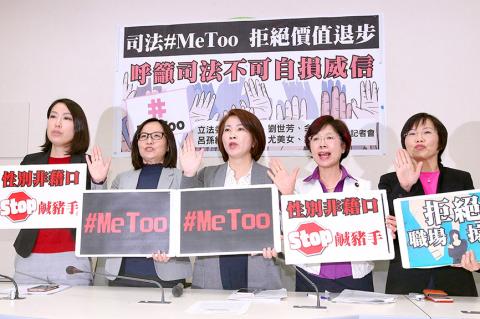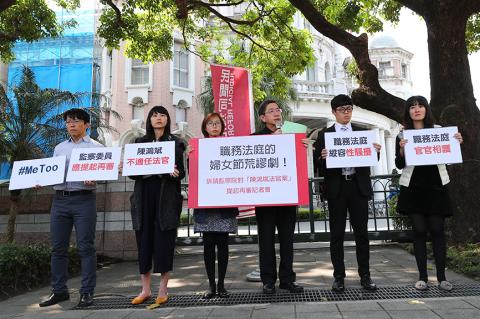Democratic Progressive Party (DPP) lawmakers yesterday lambasted a court ruling last week that allowed a judge convicted of sexual harassment to just pay a fine instead of losing his job, a ruling that was also criticized by two Control Yuan members.
The Judicial Yuan’s Court of the Judiciary in 2016 ruled that former Taipei High Administrative Court judge Chen Hung-pin (陳鴻斌) had sexually harassed his assistant and that he should be dismissed.
It was the first time a court had ordered a Taiwanese judge to be dismissed for sexual harassment, while the Control Yuan also impeached Chen for misconduct.

Photo: CNA
Chen appealed the ruling, and on Thursday the court overturned its previous ruling and decided to fine Chen an amount equal to his annual salary, or about NT$2.16 million (US$73,770). The verdict said that Chen was repentant and that only three of the eight alleged incidents of misconduct, which included kissing and hugging the assistant, constituted harassment.
However, the verdict was not a unanimous decision. Taiwan High Court Judge Hsieh Ching-hui (謝靜慧), one of the five judges presiding over the appeal, tendered her resignation after failing to convince her colleagues to uphold the original ruling.
DPP lawmakers hosting a news conference yesterday condemned the new ruling and said that they would seek to amend the Judges Act (法官法) to introduce external members to the Court of the Judiciary in a bid to improve its transparency and diversity.

Photo: CNA
DPP Legislator Chou Chun-mi (周春米) said the second trial was flawed by several procedural and other issues, such as the Court of the Judiciary not being chaired by the Public Functionary Disciplinary Sanction Committee chief commissioner, as required by law.
The ruling also failed to take into account structural factors contributing to sexual harassment, such as Chen abusing his power to harass the victim, Chou said.
“The Court of the Judiciary revoked its previous ruling and handed down a lenient monetary punishment, suggesting an ethical double standard in the judiciary as well as improperly covering up for a fellow judge,” DPP Legislator Yu Mei-nu (尤美女) said.
DPP Legislator Liu Shih-fang (劉世芳) said it was regrettable that male chauvinism was still prevalent in society, and that even judges are tolerant of sexual harassment in the workplace.
Judicial Yuan Secretary-General Lu Tai-lang (呂太郎) told lawmakers during a question-and-answer session of the legislature’s Judiciary and Organic Laws and Statutes Committee yesterday that the second ruling did not meet public expectation or the ethical standards of the judiciary.
However, the ruling is final, unless the Control Yuan decides to appeal it, Lu said.
The Control Yuan later said that it would file an appeal.
Control Yuan members Wang Mei-yu (王美玉) and Fang Wan-fu (方萬富), who handled the Control Yuan investigation into Chen and launched the impeachment procedure, said the second ruling was unreasonably different from the first.
They also cited the failure of the committee commissioner to chair the trial, saying that it suggested flaws in the legal process.

ENDEAVOR MANTA: The ship is programmed to automatically return to its designated home port and would self-destruct if seized by another party The Endeavor Manta, Taiwan’s first military-specification uncrewed surface vehicle (USV) tailor-made to operate in the Taiwan Strait in a bid to bolster the nation’s asymmetric combat capabilities made its first appearance at Kaohsiung’s Singda Harbor yesterday. Taking inspiration from Ukraine’s navy, which is using USVs to force Russia’s Black Sea fleet to take shelter within its own ports, CSBC Taiwan (台灣國際造船) established a research and development unit on USVs last year, CSBC chairman Huang Cheng-hung (黃正弘) said. With the exception of the satellite guidance system and the outboard motors — which were purchased from foreign companies that were not affiliated with Chinese-funded

PERMIT REVOKED: The influencer at a news conference said the National Immigration Agency was infringing on human rights and persecuting Chinese spouses Chinese influencer “Yaya in Taiwan” (亞亞在台灣) yesterday evening voluntarily left Taiwan, despite saying yesterday morning that she had “no intention” of leaving after her residence permit was revoked over her comments on Taiwan being “unified” with China by military force. The Ministry of the Interior yesterday had said that it could forcibly deport the influencer at midnight, but was considering taking a more flexible approach and beginning procedures this morning. The influencer, whose given name is Liu Zhenya (劉振亞), departed on a 8:45pm flight from Taipei International Airport (Songshan airport) to Fuzhou, China. Liu held a news conference at the airport at 7pm,

Authorities yesterday elaborated on the rules governing Employment Gold Cards after a US cardholder was barred from entering Taiwan for six years after working without a permit during a 2023 visit. American YouTuber LeLe Farley was barred after already being approved for an Employment Gold Card, he said in a video published on his channel on Saturday. Farley, who has more than 420,000 subscribers on his YouTube channel, was approved for his Gold Card last month, but was told at a check-in counter at the Los Angeles International Airport that he could not enter Taiwan. That was because he previously participated in two

SECURITY RISK: If there is a conflict between China and Taiwan, ‘there would likely be significant consequences to global economic and security interests,’ it said China remains the top military and cyber threat to the US and continues to make progress on capabilities to seize Taiwan, a report by US intelligence agencies said on Tuesday. The report provides an overview of the “collective insights” of top US intelligence agencies about the security threats to the US posed by foreign nations and criminal organizations. In its Annual Threat Assessment, the agencies divided threats facing the US into two broad categories, “nonstate transnational criminals and terrorists” and “major state actors,” with China, Russia, Iran and North Korea named. Of those countries, “China presents the most comprehensive and robust military threat